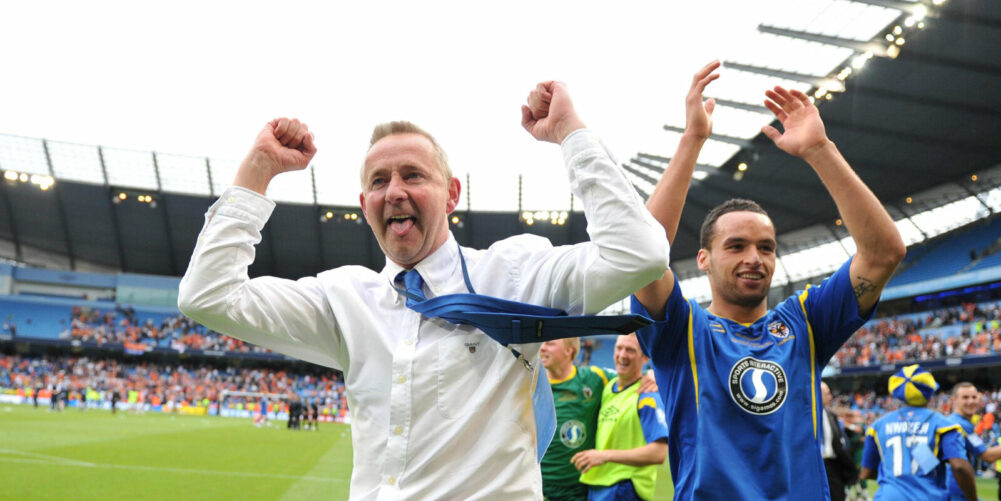PROMISED LAND: Terry Brown celebrates taking AFC Wimbledon into the Football League. Picture: PA Images
By John Lyons
When The NLP contacted Terry Brown to see if he'd be up for a chat, his initial response was ‘you must be running out of ideas'.
It was a typically humble reply from a manager with a magnificent track record which includes six promotions. Here, the 67-year-old Basingstoke Town chairman tells us about his highs and lows…
Brown made his managerial bow at Hayes in the early 1990s and went on to spend a decade at the helm. He notched up his first promotion in dramatic style in the 1995-96 season, winning the Isthmian Premier title on the last day of the season.
“I'd got into coaching at Wokingham and then the Hayes chairman Derek Goodall rang me and asked if I'd be interested in managing them.
“I did my first training session and realised none of them were fit! I couldn't help but make them better.
“In 1995, QPR sold Les Ferdinand to Newcastle for £6m and Hayes got a £600,000 sell-on fee. That was mainly spent on ground improvements, but it also boosted my budget.
“We were a bit like George Graham's Arsenal that season we won the title – we used to grind out 1-0s. In those days, it was pretty much route one football. The lucky thing was that most of the games weren't videoed!
“We ended up beating Enfield by one goal on goal difference on the last day of the season. They won 1-0 at Yeovil, but we won 3-0 at Carshalton to pip them.
“I made the luckiest substitution I ever made in that game. Centre-half Andy Cox was the heart of the Hayes team, but he broke his nose and had to come off. Junior Haynes came on for him and scored the winning goal, a blinding goal. What a tactical masterstroke!
“We went onto finish third in the Conference (in 1998-99), but we then lost all our best players.”
Brown is grateful for the support he received from Hayes chairman Derek Goodall – and believes it's a lesson for others to learn from.
“I was given a few years to assemble a team and time to make mistakes. Managers aren't given that time anymore.
“I can't ever remember Derek Goodall saying ‘you need to buck your ideas up'. He never interfered. He was a very good chairman who let you get on with the football.”
Brown helped to develop the skills of a young Jason Roberts – and Hayes went on to sell him to Wolves for a quarter of a million pounds in 1997.
“He came to us a raw 17-year-old having just been let go by Wycombe. I was working full-time at Hayes as general manager and I put a proposition to the chairman that I would train Jason full-time and then we would sell him later.
“He was getting £100-a-week at a warehouse and I went to see his mum and explained what I wanted to do. I trained with him one-on-one every day for a year and he had a great appetite to do his weights and running. The next pre-season he battered everyone.
“We then played Stevenage away and beat them 5-1 – he scored two and was unplayable. Then he murdered Hereford at home and Wolves came in with a bid of £250,000.
“I rang the chairman to tell him and he said ‘can it wait?'. I told him we'd had an offer of £250,000 and he was there in two seconds flat!
“Sunderland also offered £250,000, but his uncle, Cyrille Regis, was living in the Midlands and took him under his wing when he joined Wolves.
“He never got much of a chance there, but went on to have a great career. Now he lives in LA and has one of the best jobs in football as director of development at Concacaf!”
Brown joined Aldershot Town in 2002 and spent five years with the Shots. He led them to the Isthmian Premier crown in his first full season in charge and then to the Conference play-offs in the following two seasons.
“I didn't think I would get the job, but it was a fantastic opportunity for me to get a really big club at a low level. They just wanted to get out of the Ryman League.
“I inherited Stuart Cash – he knew the staff and how everything worked. I struck up a great friendship with him and we had lots of success at Aldershot, Wimbledon and Margate. He's a fantastic right-hand man.
“We assembled a big, ugly side that was quite expensive. At that level we would have had the biggest budget in the Ryman League by a mile, but it also brought its challenges.
“We'd send a scout to watch our next opposition and they'd be awful. Then they'd come to the Rec in front of two or three thousand and perform like world-beaters.
“We were neck and neck with Canvey Island, a really good footballing side with senior players, and we more or less won the title by beating them at their place.
“I remember going into the bar after the game and (Canvey Island manager) Jeff King bought everyone drinks, a top man.
“After that, we moved on a lot of the senior players and built a very young side. We recruited magnificently well that year – players like Aaron McLean and Tim Sills.
“Within a couple of years we had completely changed from route one to a footballing side with wingers.
“We also brought in one of my best ever signings – Ray Warburton, a really experienced centre-half. He couldn't run, but he was an inspiration in the dressing room and you'd ask yourself ‘how does he read the game that well?'. The ball seemed to be attracted to him like a magnet.
“We beat Hereford over two legs on penalties in the semi-finals and they were one of the best sides I've ever seen in Non-League football. That was one of my best-ever days.
“But then we lost to Shrewsbury in the final at Stoke on penalties and then to Carlisle on penalties in the semis the following year. That taught me a lot about the value of penalties.”
Brown's time at Aldershot came to an end in unusual circumstances in March 2007 when he resigned in order to take care of his wife Susie, who had leukaemia.
“I'm glad to say she's still alive and kicking now. She was in hospital for a year and had a bone marrow transplant.
“We were only mid-table at Aldershot that season, but I've got to say that I got the most wonderful send off at my final game in charge against Weymouth. How many managers get to wave goodbye to the crowd? The fans went round with a massive bucket to raise money and the club paid up my contract.”
Later that year, Brown was enticed back to management by the challenge of helping phoenix club AFC Wimbledon's bid to surge up the divisions. Three promotions followed in the next four years, taking the Dons into the Football League, and extending his personal promotion tally to five.
“Susie was still in hospital, but she said ‘you've got to take it' when I was offered the job.
“Wimbledon wanted us to do what we had done at Aldershot – take over a massive club in a tiny league and deal with the expectation levels.
“We brought senior winners in, part-time players that could win promotion, but it was a very difficult year. We drew at home against Staines, a really good side, early in the season and the fans were booing. A fan ran on the pitch and ripped up his season ticket – we were only about five games in! In the end, we won 2-1 at Staines in the play-off final. We were getting beat 1-0 with ten minutes to go and it could have easily gone the other way.
“It enabled us to jettison the senior players, which isn't easy, but we wanted to do what we'd done at Aldershot – bring in a young, footballing side.
“We thought we would struggle in Conference South but we just steamrolled it. Our first game was at Newport County and Jon Main ripped them apart (in a 4-1 win). I remember getting on the coach afterwards and thinking ‘we'll be alright in this league'. We played some great football, some of the best football myself and Stuart have produced. We were more or less up after a draw with Hampton and every pub in Wimbledon was yellow and blue. We had a party all night after that game.
“We finished eighth as a part-time club in our first season in the Conference. We then made some acquisitions and were ready to go full-time – that's a massive transition at any club. We were pretty much second to Crawley all that year and played fantastically well.
“Going into the play-off final against Luton (a 0-0 draw), we practised our penalties and I knew Danny Kedwell would take us into the League with his penalty.
“It was fulfilling an ambition for the club, and for Stuart and myself that we would work in the Football League. We knew we'd have to take a club into it to get a chance there. I was absolutely shattered, it was pure relief.”
But, just over a season after taking Wimbledon to the promised land, Brown was sacked.
“It was a learning curve and recruitment is everything. We had recruited fantastically in Non-League and knew the best players, but we didn't really have a budget for a scouting system.
“We consolidated in the first year, but then didn't get the recruitment right. We thought seven games in to the next season was too early, but the truth was the recruitment wasn't good enough at that level.”
Brown bagged his sixth and final promotion – and fourth from the Isthmian League – with Margate in 2014-15.
“The club had a very rich benefactor (Bob Laslett) and he wanted me and Stuart to roll through the leagues again, and we had a massive budget. We started off well, but we had an experienced team who didn't really want to play on a Tuesday night at an Isthmian ground. It was a difficult year, but we managed to get promotion by beating Hendon in the play-off final at Harrow.
“Bob pulled his money after about 18 months. To be fair to him, he did the honourable thing and there wasn't one Margate player not paid up.”
In the last few years, Brown has been manager, director of football and, now, chairman at beleaguered Basingstoke Town.
“The owner Rafi Razzak decided that he'd put enough money into the club over the years and I was brought in to try to make the club sustainable. The budget had to be severely slashed and it got to the stage where the fans had to subsidise it to the sum of £40,000. In 2017, we started the Basingstoke Town Community Club and in August last year we legally took over.
“That summer we had been evicted from the Camrose and secured a groundshare at Winchester. We are now hoping to move into the Winklebury site back in Basingstoke in September or October. We have a 40-year lease with the council and the Hampshire FA.”
So, are Brown's management days over?
“I had 30 years spending people's money and one thing I've learned is that it's a lot easier than trying to raise the money! At the moment I've got the biggest job I've ever had in football trying to ensure the survival of Basingstoke Town.”
Brown, though, can rightly look back at his career with pride.
“I'm very proud of the fact that I was the manager who took Wimbledon into the Football League and had success with Hayes, Aldershot and Margate.
“However, I'm just as proud that I'm still in contact and go for a drink with players from every club I've been at.
“It's nice to see some of your old players doing great jobs in management and you get a sense of pride when you help players move onto the Football League or do as well as they can. Mind you, I've fallen out with lots of players as well!”





















